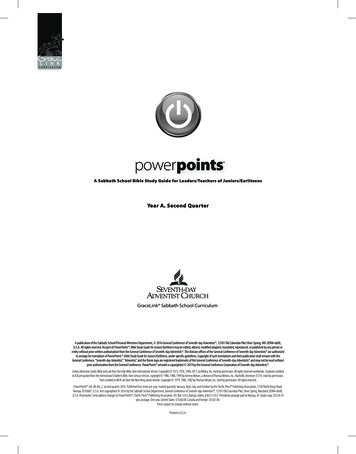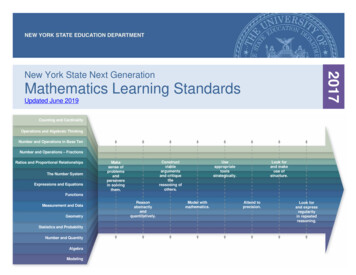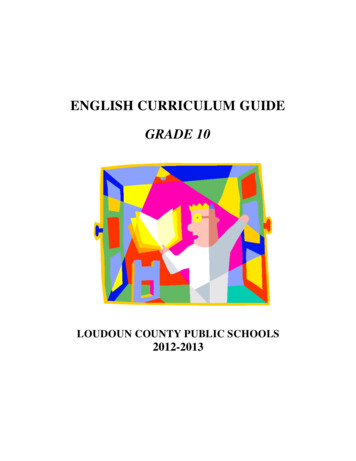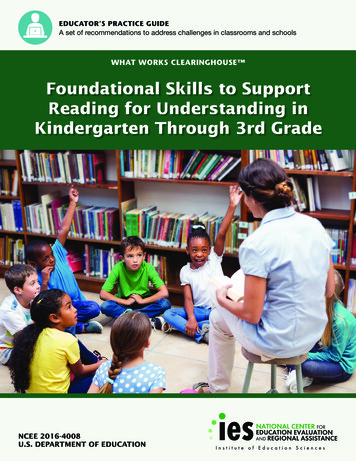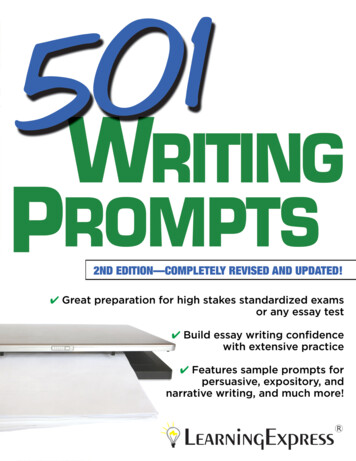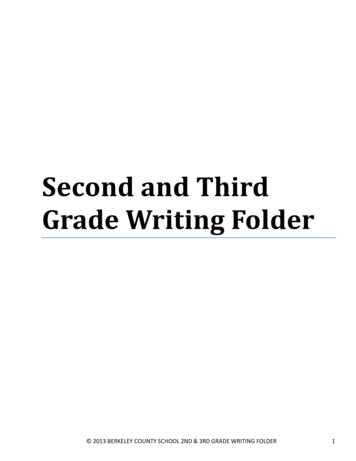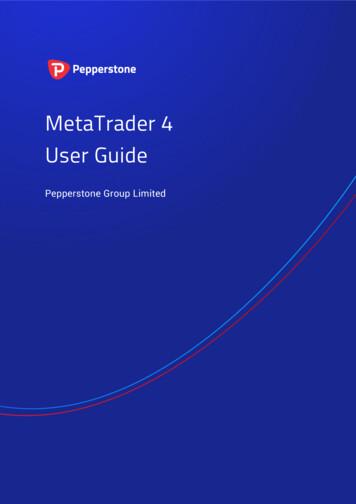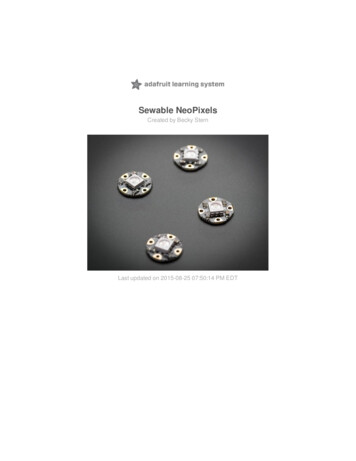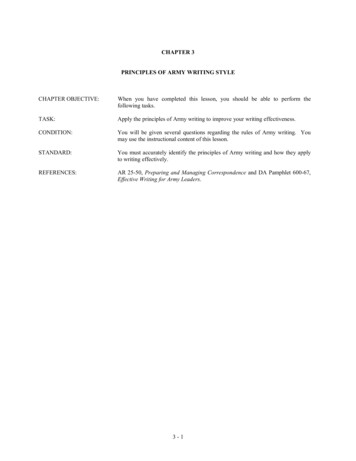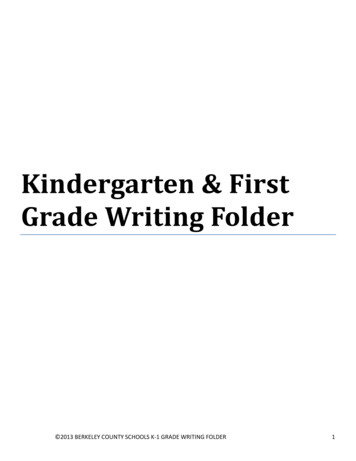
Transcription
Kindergarten & FirstGrade Writing Folder 2013 BERKELEY COUNTY SCHOOLS K-1 GRADE WRITING FOLDER1
Table of ContentsOnline Writing Sites . 4RUBRIC . 5Meaning of Cups . 6Cups Worksheet . 7Kindergarten Writing Rubric . 8First Grade Check List . 9First Grade Writing Rubric .10PROMPTS.11School Writing Worksheet.12Kids Writing Worksheet .13Halloween Writing Worksheet with Name .14Thanksgiving Writing Worksheet with Name .15100 days of School Writing Worksheet .16Valentine Writing Worksheet with name.17Easter Writing Worksheet .18Birthday Writing Worksheet .19Blank Writing Worksheet .20SENTENCES .21Types of sentences .22Introduce Other Sentence Strategies .23TRANSITIONAL WORDS .24K-2 Transitional Words .25GRAMMAR.26Frequent Mistakes .27Correct Use of Good and Well .28Correct Use of May and Can .28Correct Use of Pronouns .28Politeness! .29Using the correct word .30Homophones .30Frequently heard mispronounced words: .31*Remember your job: .31 2013 BERKELEY COUNTY SCHOOLS K-1 GRADE WRITING FOLDER2
What is a sentence? .32Verb .32Types of verbs: .32Nouns .33Pronouns.34Adjectives .35Adverbs.36Prepositions .37Interjections .37Conjunctions .37List of additional prompts on the Berkeley County Writing Web Site .39 2013 BERKELEY COUNTY SCHOOLS K-1 GRADE WRITING FOLDER3
Online Writing SitesTry storybook pbskids.org/superwhy/#game/storybookcreator (guided tory/index.html (guided aker/embed.cfm (create your own story)http://pbskids.org/storyfactory (create your own story) Fun Brain's Words Page has a variety of games designed to assist kids with writing skills.Children can test their skills at understanding plurals, grammar, vocabulary, storystructure, idioms, and commonly confused words.I Know That! a multimedia education site, has several games dedicated to writing skills,including sentence puzzle and punctuation paintball.Buzz In's English and Writing Page is excellent for older elementary school students. Kidscan click to learn about different aspects of writing and take a fun quiz to test theirskills.Jenny Eather's Writing Fun is an interactive tool designed to improve children's writingskills by clearly indentifying the parts and processes of various types of writing. Theeasy-to-use online text organizer helps kids to feel confidant their writing is organizedwell.BrainPOP Junior's Writing offers a fun way to learn writing skills through short,interactive movies on topics like paragraphs, tenses, and types of sentences.Magic Tree House Writing Club helps children improve writing skills through reading,writing, and organizing fiction. Mini lessons with characters from the popular MagicTree House series help young writers grow and learn.Sentence ouse/ 2013 BERKELEY COUNTY SCHOOLS K-1 GRADE WRITING FOLDER4
RUBRIC 2013 BERKELEY COUNTY SCHOOLS K-1 GRADE WRITING FOLDER5
Meaning of CupsC U P g 2013 BERKELEY COUNTY SCHOOLS K-1 GRADE WRITING FOLDER6
Cups WorksheetName: 2013 BERKELEY COUNTY SCHOOLS K-1 GRADE WRITING FOLDER7
Kindergarten Writing RubricNameCheck your work and fill out the rubric below by coloring eitherthe happy face or the sad face.Did I .Did I start mysentence with acapital letter?Did I write asentence that thereader canunderstand?Did I usepunctuation at theend of everysentence?(.?!)Did I use a fingerspace betweeneach word and afterevery sentence?YesNo 2013 BERKELEY COUNTY SCHOOLS K-1 GRADE WRITING FOLDER8
First Grade Check ListFirst Grade Check-UpFirst Grade Check-UpName:Name:Date:Date:Did I write complete sentences?Did I write complete sentences? Did I use neat handwriting?Did I use neat handwriting? Did I capitalize the correct words?Did I capitalize the correct words? Did I use the correct punctuation? ( . ! ?)Did I use the correct punctuation? ( . ! ?) Did I do my best work?Did I do my best work? Comments:Comments: 2013 BERKELEY COUNTY SCHOOLS K-1 GRADE WRITING FOLDER9
First Grade Writing RubricNameDateFirst Grade Writing 4321(Conveys meaning through writing)Conventions(Finger spaces, capitals, punctuation)Comments:Name DateFirst Grade Writing 4321(Conveys meaning through writing)Conventions(Finger spaces, capitals, punctuation)Comments: 2013 BERKELEY COUNTY SCHOOLS K-1 GRADE WRITING FOLDER10
PROMPTSSee additional prompts online:For a list of prompts, see page 39 in this folder. 2013 BERKELEY COUNTY SCHOOLS K-1 GRADE WRITING FOLDER11
School Writing Worksheet 2013 BERKELEY COUNTY SCHOOLS K-1 GRADE WRITING FOLDER12
Kids Writing Worksheet 2013 BERKELEY COUNTY SCHOOLS K-1 GRADE WRITING FOLDER13
Halloween Writing Worksheet with NameNameDate 2013 BERKELEY COUNTY SCHOOLS K-1 GRADE WRITING FOLDER14
Thanksgiving Writing Worksheet with Name 2013 BERKELEY COUNTY SCHOOLS K-1 GRADE WRITING FOLDER15
100 days of School Writing Worksheet 2013 BERKELEY COUNTY SCHOOLS K-1 GRADE WRITING FOLDER16
Valentine Writing Worksheet with name 2013 BERKELEY COUNTY SCHOOLS K-1 GRADE WRITING FOLDER17
Easter Writing Worksheet 2013 BERKELEY COUNTY SCHOOLS K-1 GRADE WRITING FOLDER18
Birthday Writing Worksheet 2013 BERKELEY COUNTY SCHOOLS K-1 GRADE WRITING FOLDER19
Blank Writing Worksheet 2013 BERKELEY COUNTY SCHOOLS K-1 GRADE WRITING FOLDER20
SENTENCES 2013 BERKELEY COUNTY SCHOOLS K-1 GRADE WRITING FOLDER21
Types of sentencesDeclarative - Telling sentence, ends with a period .Interrogative - Asking sentence, ends with a question mark ?Imperative - Demanding sentence, ends with a period .Exclamatory - Shows strong feeling, ends with an exclamatory point ! 2013 BERKELEY COUNTY SCHOOLS K-1 GRADE WRITING FOLDER22
Introduce Other Sentence Strategies 2013 BERKELEY COUNTY SCHOOLS K-1 GRADE WRITING FOLDER23
TRANSITIONAL WORDS 2013 BERKELEY COUNTY SCHOOLS K-1 GRADE WRITING FOLDER24
K-2 Transitional WordsTime words:To compare:To support:FirstAlsoThereforeSecondIn factFor instanceThirdMeanwhileFor exampleNextHoweverAs a resultLastStillIn additionFinallyFurtherIn conclusionAgainFurthermoreCertainlySoonOn the etThen 2013 BERKELEY COUNTY SCHOOLS K-1 GRADE WRITING FOLDER25
GRAMMAR 2013 BERKELEY COUNTY SCHOOLS K-1 GRADE WRITING FOLDER26
Frequent MistakesIncorrect: I seen it. I done it. I done my homework.Correct: I have seen it. I had done it. I have done my homework.or I did my homework.Do NOT use the past participle of a verb without an auxiliary or helping verb.Tenses of verbsPresentPastPast Participle(past participle must beused with a helping ect: It was so fun.Correct: It was so much fun.So is an adverb telling how much. Fun is a noun meaning pleasure or enjoyment.Adverbs (in this case so) may not modify nouns! Adverbs modify verbs, adjectivesor other adverbs only! 2013 BERKELEY COUNTY SCHOOLS K-1 GRADE WRITING FOLDER27
Correct Use of Good and WellIncorrect: He did good. She sang good. We done good.(Two mistakes. Good should be well and done is a participle and needsauxiliary/helping verb.)Correct: He did well. She sang well. We did well.Good is an adjective and can only modify nouns not verbs. Well is an adverb and isused to modify verbs. If you have an action verb as did, done and dang all youneed an adverb to modify the verb.Sometimes well can be an adjective—if it is describing a person’s health.(Please note both adjectives and adverbs are modifiers. If they modify a noun,pronoun, phrase or clause acting like a noun the modifier is an adjective. If themodifier modifies a verb, adverb, or other adverb then the modifier is an adverb.)Correct Use of May and CanCan means are you able to do something as in:Can you fix this bike for me?May means to ask permission as in:May I go to the movies?Correct Use of PronounsIncorrect: Me and Johnny went to the movies.Correct: Johnny and I went to the movies. 2013 BERKELEY COUNTY SCHOOLS K-1 GRADE WRITING FOLDER28
Politeness!Always put the other person first in any situation where you are speaking orwriting about yourself and someone else. Also when using a compound subject usethe nominative case of the pronoun: I, we, you, he, she, it, they. When a pronounis used as a direct or indirect object of the verb or of a preposition, whether simpleor compound, put the other person (Politeness) first, and use the objective case ofthe pronoun:She gave the tickets to Johnny and me. Or She gave us the tickets.Incorrect: It is me. This is him.Correct: It is I. This is he.In these sentences the pronoun is used as the subject compliment/nominative sothe pronoun must be in the nominative case. This type of sentence has a linkingverb and a subject complement/nominative completing the subject by renamingthe noun or pronoun equally on the right side of the verb.Incorrect: Who do you want to see?Correct: Whom do you want to see?Whom in this sentence is the direct object and must be in the objective case. (Whois a subjective pronoun in the nominative case.) 2013 BERKELEY COUNTY SCHOOLS K-1 GRADE WRITING FOLDER29
Using the correct wordIncorrect: Are books (It is often said that way.)Correct: Our booksAre is an auxiliary/helping verb.Our is a second person possessive pronoun.Incorrect: I am anxious to go on vacation.Correct: I am eager to go on vacation.Anxious means worried or troubled. Eager means looking forward to it.HomophonesThere in that placeTheir a pronoun meaning belonging to themThey’re a contraction meaning they areHere in this placeHear listen with your earIts a pronoun meaning belonging to itIt’s a contraction meaning it is 2013 BERKELEY COUNTY SCHOOLS K-1 GRADE WRITING FOLDER30
Frequently heard mispronounced words:Speaking words happens more quickly than writing or typing and often words areslurred or abbreviated in speaking. For example: Many times the speaker will dropthe g in a word ending in –ing: going becomes gunna. I am gunna go to the storerather than I am going to the store.She’s runnin’ for for office rather than she is running for office.I was shiverin’ from the cold, rather than I was shivering from the cold.*Remember your job: is not to correct others’ speech. (Speech is more casual than writtenlanguage and is delivered faster, so grammatical mistakes will happen.) is to correctly use grammar in your writing (and then hopefully in yourspeech). is to find your mistakes and correct your own writing.*ONLY if you are asked to help edit someone else’s writing, do you correct theirmistakes. 2013 BERKELEY COUNTY SCHOOLS K-1 GRADE WRITING FOLDER31
What is a sentence?A sentence must contain a subject and a predicate (main verb).*Every predicate includes a verb or verb group, but not every verb or verbgroup is a predicate. (Without a main verb, it is a fragment.)*A subject must be a noun, pronoun, or a group of words that can act as anoun.VerbVerbs may be in past or present tense. A participle may not act as a main verbwithout a helping or auxiliary verb:do/does/did, have/has/had, or am/is/are/was/were that agrees with thesubject. Also helping verbs called Modals may be used can/could,will/would, shall/should, may/might, or must.Types of verbs:Main verb-conveys main action, happening, or state of being.Linking verb conveys a state of being (is), relates to the senses (tastes, fells, smellsappears), or indicates a condition (grows, feels)Auxiliary verb (helping verb) employed by the main verb to show tense, mood orvoice. These are:Modals which include can/could, may/might, shall/should, will/would and others.Other auxiliary verbs include do/does/did/done, be/am//is/are/been, was/were,have/has/had when combined with other verbs. 2013 BERKELEY COUNTY SCHOOLS K-1 GRADE WRITING FOLDER32
NounsA noun as a subject is the central actor in a sentence; it may be simple, complete, orcompound.A noun as the recipient of the action on of the verb is a direct object.A subject complement/nominative completes the subject by renaming the noun or pronounequally on the right side of a linking verb.“She was the winner.” Or “The teacher was a resident of the town.”Verbs such as taste, become, looked, stayed and others can act as linking verbs not justis/are/was/were.A noun can be an indirect object if it is the recipient of an in direct or secondary action.“Give me a break.” Or “We made our customers special cupcakes.”A noun can be an appositive by renaming it adjacent to the subject.Bill, my friend, met me at the restaurant.A noun can act as the object of a preposition.“to the store”.A noun can act as an adverb when used as an adverbial object.“I saw him this morning.”A noun can be used as an adjective when it modifies a noun.“mail truck” or “garden pest”.A noun can be a direct address/vocative.“John, please come here.”A noun can be an object when it renames the direct object.“The team named the bulldog or mascot.”A noun can be a gerund (A verb turned into a noun by adding –ing).teaching/learning/texting.A noun can be an infinitive (to plus a verb). However not all infinitives are nouns.Any group of words that can take the place of a pronoun can act as a noun.They saw my sister and me. (Us); I know where they are. (that/this); The man in theblack hat (he) is standing. 2013 BERKELEY COUNTY SCHOOLS K-1 GRADE WRITING FOLDER33
PronounsPronouns can be in different case:Pronouns can be subjective, the subject of a sentence.I/we, you, he/she, it, theyPronouns can be objective, the object in a sentence.me/us, you, him, her, it, themPronouns can be possessive showing ownership.my/ mine, our/ours, yours, his/hers/its/theirsPronouns can be relative.who/whose/whom, which what thatPronouns can be interrogative.Who/Whose/whom? Which? What?Pronouns can be demonstrative and refer to an antecedent.this/these, those/thatPronouns can be reflective.myself, yourself, himself, herself, itself, ourselves, yourselves,themselvesPronouns can be reciprocal and refer to individual parts of an antecedent.“each other”Pronouns can be indefiniteany, each, some, anybody/anything/anyone, everybody/everything,everyone, someone/somebody/something(Please note both adjectives and adverbs are modifiers. If they modify a noun,pronoun, phrase or clause acting like a noun the modifier is an adjective. If themodifier modifies a verb, adverb, or other adverb then the modifier is an adverb.)For example: good is an adjective, well is an adverb when describing how an actwas completed, but well is an adjective when describing a person’s health. 2013 BERKELEY COUNTY SCHOOLS K-1 GRADE WRITING FOLDER34
AdjectivesAdjectives modify nouns or pronouns. They answer the questions which, what kindof, or how many about the noun or pronoun.Adjectives are compliments after linking verbs: The children are happyAdjectives can be comparative. (having different levels of ierSuperlative:besthappiestNoun adjectives can be nouns that modify other nouns as baby sitter, truck driver.Proper adjectives are formed by adding –ful, -ing, -an, -ish, -less, -like to a propernoun:American, Middle Eastern, English, CongressionalAny group of words (phrases or clauses) that follows a noun and does not renamethe noun is used as an adjective:The car that he drove is expensive.Limiting adjectives or determiners convey whether the nouns are general orspecific, how many there are, and which ones it is:A. Articles—a, an, theB. Demonstrative—this, these that, thoseC. Indefinite—any, each, few, some, otherD. Interrogative—what, which, whoseE. Numerical—one, first, two, second, three, third, four fourthF. Possessive—my, your, their, othersG. Relative—what, which, whose, whatever, and others. 2013 BERKELEY COUNTY SCHOOLS K-1 GRADE WRITING FOLDER35
AdverbsAdverbs modify verbs, adjectives, and other adverbs. They answer the questionhow, when, where, and why.Adverbs sometimes end in –y, but not always.Adverbs can be terSuperlative:farthestbestConjunctive adverbs modify by creating logical connections:A. Addition—also, furthermore, moreover, besidesB. Contrast—however, still nevertheless, nonetheless, instead, otherwiseC. Comparison—similarly, likewiseD. Result or summary—therefore, thus, consequently, accordingly, hence, thenE. Time—next, then, meanwhile, finallyF. Emphasis—indeed, certainlyAn adverb can introduce an adjective clause as in:The cabin where we stayed was small. 2013 BERKELEY COUNTY SCHOOLS K-1 GRADE WRITING FOLDER36
PrepositionsPrepositions begin prepositional phrases. The list of preposition must ctions are words or expressions that convey surprise or strong emotion.Alone they are followed by an exclamation point. As part of the sentence they areset off by a comma.ConjunctionsConjunctions connect words, phrase, and clauses.Coordinating conjunctions connect two grammatically equivalent structures:A. Addition—andB. Contrast—but, yetC. Result or effect—soD. Reason or cause—forE. Choice—orF. Negative choice—nor 2013 BERKELEY COUNTY SCHOOLS K-1 GRADE WRITING FOLDER37
Correlative conjunctions are used in pairs to connect equivalent grammaticalstructures.A. Both.andB. Either.orC. Neither.norD. Not only.but (also)E. Whether.orF. Not.so much asSubordinating conjunctions introduce dependent clauses that are not as importantas the independent clause.A. Time—before, after, once, since, until whileB. Reason, choice or cause—as, because, since, rather than, whetherC. Result or effect—in order that, so, so that, thatD. Condition—if, even if, provided that, unlessE. Contrast—although, even though, though, whereas 2013 BERKELEY COUNTY SCHOOLS K-1 GRADE WRITING FOLDER38
List of additional prompts on the Berkeley CountyWriting Web SiteFrom the Berkeley County Web Site, go to Departments, Federal Programs, andTitle I Resources for Schools.Or click on the following link.http://berkeleycountyschools.org/Page/342From here, you will find additional files under the following categories: ACCESS FOR TEACHERS ACRONYMS POSTERS ACTIVITIES ADDITIONAL HELPS EDITING ESSAYS FLIP CHARTS FORMS FOR RECORDING SCORES GRAMMAR PROMPTS RUBRIC SENTENCES WEBS*This list is subject to change as additional information is needed and added. 2013 BERKELEY COUNTY SCHOOLS K-1 GRADE WRITING FOLDER39
First Grade Writing Rubric Sentences (Conveys meaning through writing) 4 3 2 1 Conventions (Finger spaces, capitals, punctuation) 4 3 2 1 Illustration 4 3 2 1 Handwriting 4 3 2 1 Comments: Name _ Date _ First Grade Writing Rubric Sentences (Conveys meaning through
